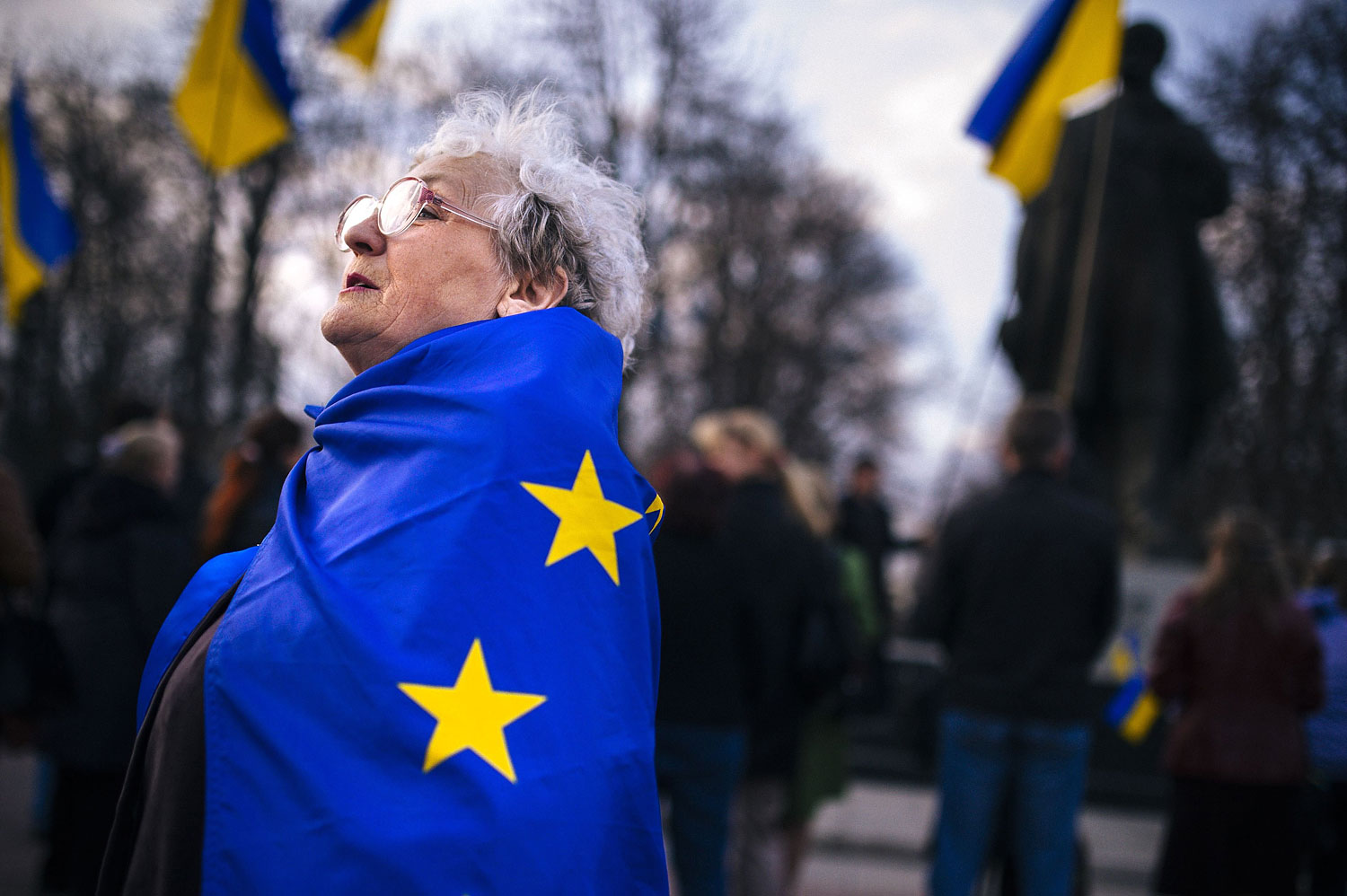
When it comes to assigning blame for the volatile situation in eastern Ukraine, European politicians are united: it is all Russia’s fault. That’s about where the unity ends, as became clear after a meeting of foreign ministers from European Union member states on Monday. When they shuffled out of their meeting, their joint communiqué was as familiar as it was inconclusive. A few Russian names would be added to a list of people with their assets frozen, ever so slightly expanding the mild sanctions that Russia has so far mocked and ignored. Then came more threats of deep economic sanctions at an unspecified time and with no clear trigger for such measures.
This may seem like a rather restrained response to the specter of a military Russian assault on Ukraine – German Vice-Chancellor Sigmar Gabriel said at an event in Berlin on Monday that Russia “was clearly prepared to allow tanks to roll across European borders” – but the E.U.’s 28 member nations are struggling to get past their widely differing political and economic concerns. Hitting the E.U.’s €400bn annual trade with Russia would require serious economic sacrifices at home, and the bloc has so far been hoping that its cocktail of threats, mild sanctions and a few diplomatic snubs would be enough to contain Russia’s possible territorial ambitions.
The problem, says Stefan Wolff, a professor of international security at the University of Birmingham, is that Russian President Vladimir Putin does not “reason and rationalize in the same way,” and has proved ready to jump on any public splits and timidity.
Ever since the E.U. provoked Moscow’s ire with plans to sign a trade pact with Ukraine in November, Russia has always seemed one step ahead. Putin persuaded then-President Viktor Yanukovich to jettison the deal; when Yanukovich was ousted by protests a few months later, Russia took advantage of the chaos and seized Crimea. Now Russia is accused of orchestrating the unrest in eastern Ukraine – claims Russian officials strongly deny.
The E.U.’s strongest reaction so far – visa-bans and asset-freezes on 33 Russian and Ukrainian individuals – came after the annexation of Crimea. Now the problem is getting the member states to agree at what stage the Kremlin’s alleged engineering of events in eastern Ukraine warrants the most serious sanctions against key economic sectors that include energy, arms and financial services.
Such sanctions would have a widely different impact across Europe. In the east, nations like Hungary and Bulgaria, which are heavily reliant on Russian oil and gas, would suffer if Moscow responded to any sanctions by halting supplies. Cyprus, Greece and Spain, still struggling from the euro zone crisis, have a lot of Russian money in their banks. German industry has firm business relations with Russian companies.
The result is a diverse bloc arguing for diplomacy to be given more time. The more bullish nations are also acting with a degree of self-interest: Estonia and Latvia share borders with Russia and fear designs on their own territory. The United Kingdom – leading the calls for more sanctions – has its reputation as a forceful world player to maintain.
Russia has shown a willingness to exploit these splits, last week sending a letter to 18 E.U. nations reliant on its energy and making veiled threats to the supplies. Officials in Washington have urged their partners in Europe to stay united and have pushed them toward imposing deeper sanctions. But the United States has both less to lose, and less sway.
“From an economic perspective the U.S. cannot impose strong sanctions on Russia,” says Georg Zachmann, a research fellow at the Brussels-based Bruegel think tank, citing the U.S.’s modest trading relationship. In 2012, Russian exports to the U.S. totalled $13 billion. The same year Russia sent goods worth €213 billion ($294 billion) to the E.U. The sale of oil and gas accounts for 50% of Russia’s federal budget reserves, and most of that goes to Europe. So the E.U. does have a hefty weapon in its toolbox.
The next few days will be crucial. Ministers from Russia, the E.U., the U.S. and Ukraine will meet in Geneva on Thursday. French Foreign Minister Laurent Fabius has said that unless they get an acceptable response from Russia, the E.U. heads of state could call an emergency meeting in Brussels next week.
The threat of holding yet another meeting may seem a typical example of the E.U. meeting aggression with bureaucracy. But if they use that opportunity to make good on their threats and approve the next phase of sanctions, Russia finally might start paying attention.
More Must-Reads From TIME
- The 100 Most Influential People of 2024
- The Revolution of Yulia Navalnaya
- 6 Compliments That Land Every Time
- What's the Deal With the Bitcoin Halving?
- If You're Dating Right Now , You're Brave: Column
- The AI That Could Heal a Divided Internet
- Fallout Is a Brilliant Model for the Future of Video Game Adaptations
- Want Weekly Recs on What to Watch, Read, and More? Sign Up for Worth Your Time
Contact us at letters@time.com